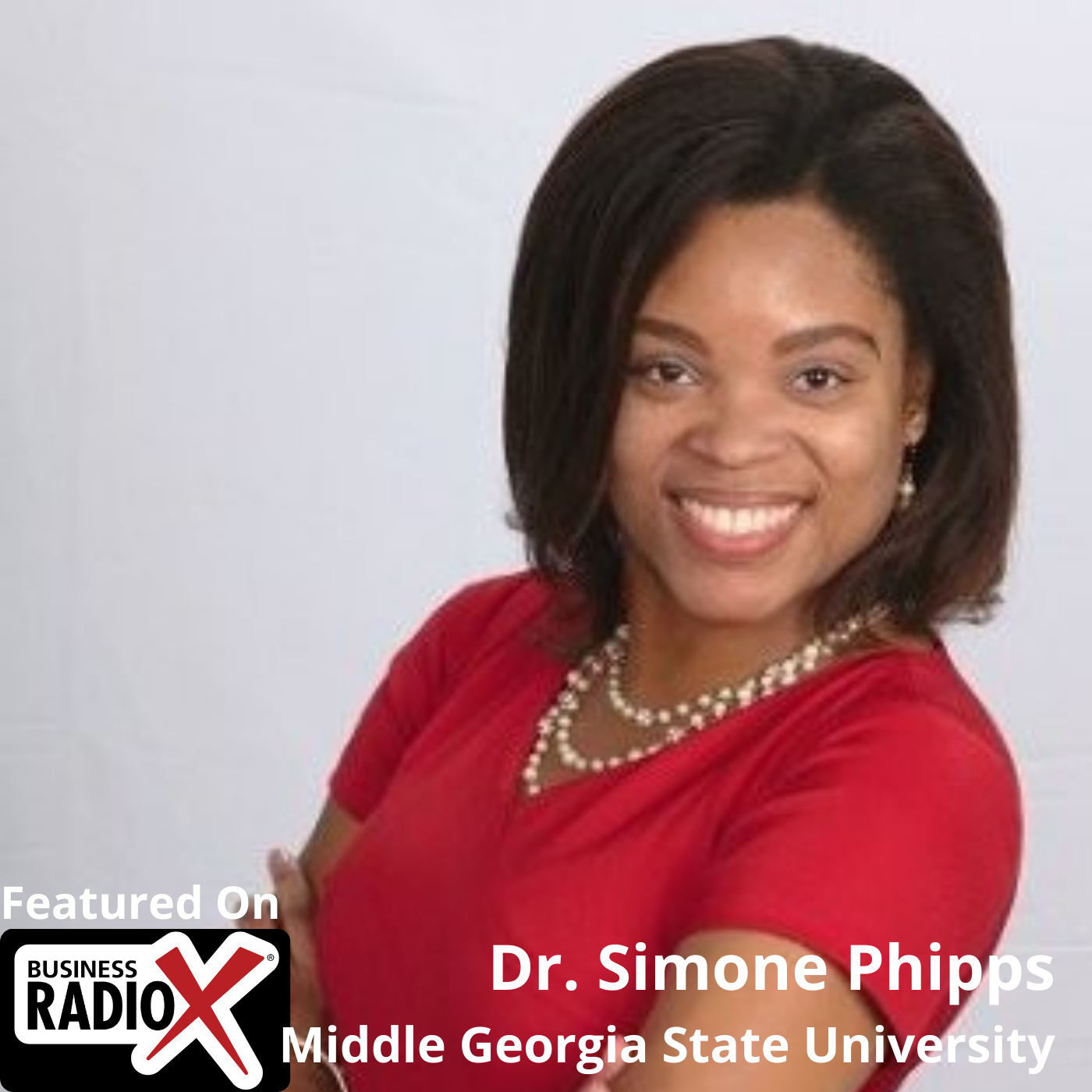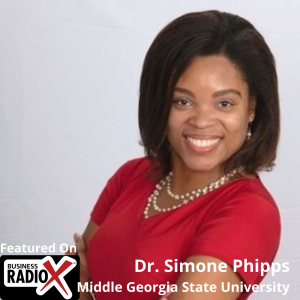
Dr. Simone Phipps, Middle Georgia State University (North Fulton Business Radio, Episode 347)
In a conversation with host John Ray, Dr. Simone Phipps discussed her research on innovative yet overlooked African American women entrepreneurs such as Maggie Lena Walker, their successful adaption of the philosophy of cooperative advantage, and much more. “North Fulton Business Radio” is produced virtually from the North Fulton studio of Business RadioX® in Alpharetta.
Middle Georgia State University
Middle Georgia State University educates and graduates inspired, lifelong learners whose scholarship and careers enhance the region through professional leadership, innovative partnerships, and community engagement.
Middle Georgia State University has a history that is unlike most other institutions of higher education in the United States. Not only is it Georgia’s newest university — as of July 2015 – it’s also one of Georgia’s oldest institutions. Its origins go back to the late 19th century, and its name has been changed several times.
In 1884, the New Ebenezer Baptist Association established New Ebenezer College, a junior college in Cochran, Georgia. The first classes were held in 1887. However, just 12 years later the association discontinued its support, forcing the college to close in 1898.
In 1919, the Georgia State College of Agricultural and Mechanical Arts – a division of the University of Georgia – opened a branch on the old Ebenezer campus. In 1927, the college’s name was changed to Middle Georgia Agricultural and Mechanical Junior College, and in 1929 the name was changed to Middle Georgia College, which remained as a two-year junior college operated by a board of trustees.
Two years later, in 1931, the college became a junior college unit of a new organization called the University System of Georgia.
Middle Georgia College continued to move forward, building athletic programs and new facilities. The college’s baseball team won four national junior college championships. The college opened a campus in Dublin; large student dormitories were constructed on the Cochran campus; and in 2007 the Georgia Aviation Technical College in Eastman was merged with Middle Georgia, giving the college three campuses.
Meanwhile, about 40 miles to the northwest in Macon, a new junior college was established by the University System. Macon Junior College opened in 1968 with more than 1,100 students — the largest enrollment ever for a new college in Georgia. In 1987, it became Macon College when the USG dropped the word “junior” from its two-year institutions.
The college continued to grow, and in 1997 when the college began offering bachelor’s degrees the name changed to Macon State College. The college had established teaching facilities at two locations in Warner Robins, and in 2003 a new campus opened about one-half mile from the main gate at Robins Air Force Base. An apartment complex adjacent to the Macon Campus was acquired in 2010, giving Macon State College its first student housing.
In 2012, the Board of Regents voted to consolidate Macon State College and Middle Georgia College; the new college was named Middle Georgia State College, which incorporated all facilities and all five campuses of the two previous institutions.
Dr. Simone Phipps, Associate Professor of Management, School of Business, Middle Georgia State University

Simone T. A. Phipps, MBA, PhD, SPHR, SHRM-SCP is an Associate Professor of Management in the School of Business at MGA, where she has taught Organizational Behavior, Entrepreneurship, Principles of Management, Human Resource Management, and Strategy at the undergraduate level, and Leadership at the graduate level. Her research interests are management and labor history, entrepreneurship, HR practices, and leadership.
She has published in a number of scholarly, peer-reviewed journals, including the Journal of Business Ethics, Journal of Management History, International Journal of Leadership Studies, and Journal of Leadership, Accountability and Ethics. She also presents her research at conferences such as the Academy of Management Annual Meeting (AOM), Southern Management Association (SMA) Annual Meeting, United States Association of Small Business and Entrepreneurship (USASBE) Conference, Labor and Employment Relations Association Conference (LERA), Academy of Human Resource Development (AHRD) Conference, International Council for Small Business (ICSB) Conference, and the Business History Conference (BHC).
In addition, she serves as an Editorial Board Member for the Journal of Management History (JMH). She is also the founding advisor of the Society for Advancement of Management (SAM) at Middle Georgia State University (MGA), and the founding coordinator of the annual Knights’ Business Battle, a business plan competition sponsored by the School of Business at MGA. As regards community service, she is a volunteer with the Boys and Girls Clubs of Central Georgia.
Dr. Phipps holds a Bachelor’s degree in Management Information Science (MIS) from Claflin University, earned her MBA from Ohio University, and Ph.D. in Human Resource and Leadership Development from Louisiana State University. She is also a certified Senior Professional in Human Resources (SPHR) and Society for Human Resource Management Senior Certified Professional (SHRM-SCP).
Questions and Topics in this Interview:
- Tell me a bit about yourself and your professional interests.
- Considering your research interests, why is gender, and the intersection of gender and race such an important topic when it comes to leadership?
- Lessons to be learned from accomplished entrepreneurs such as Maggie Lena Walker and Annie Turnbo Malone
- What can be done to increase the number of women, and particularly Black women in leadership?
- In your co-authored book, the main theme is cooperative advantage. How does this concept fit into addressing the disparities in leadership?
- Your research interests also include management history. Are there any figures from history that stand out to you as advocates for women and especially Black women in leadership?
“North Fulton Business Radio” is hosted by John Ray and produced virtually from the North Fulton studio of Business RadioX® in Alpharetta. You can find the full archive of shows by following this link. The show is available on all the major podcast apps, including Apple Podcasts, Spotify, Google, Amazon, iHeart Radio, Stitcher, TuneIn, and others.
Renasant Bank has humble roots, starting in 1904 as a $100,000 bank in a Lee County, Mississippi, bakery. Since then, Renasant has grown to become one of the Southeast’s strongest financial institutions with over $13 billion in assets and more than 190 banking, lending, wealth management and financial services offices in Mississippi, Alabama, Tennessee, Georgia and Florida. All of Renasant’s success stems from each of their banker’s commitment to investing in their communities as a way of better understanding the people they serve. At Renasant Bank, they understand you because they work and live alongside you every day.
















